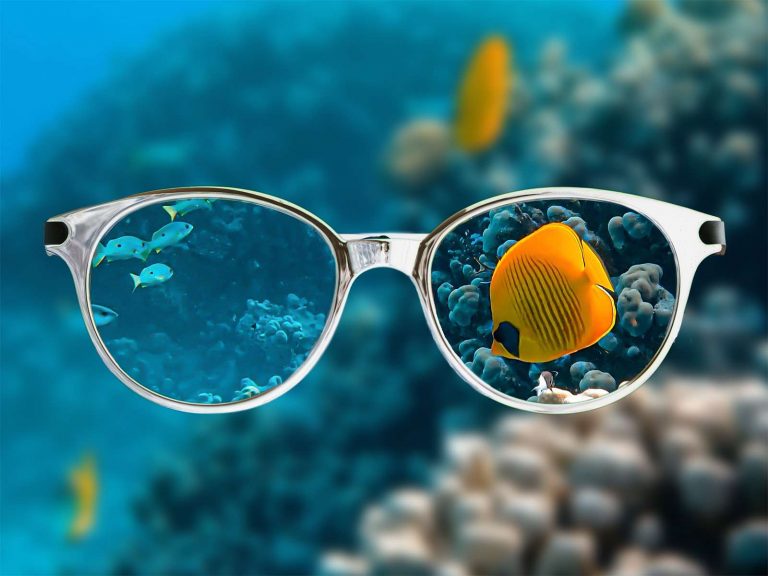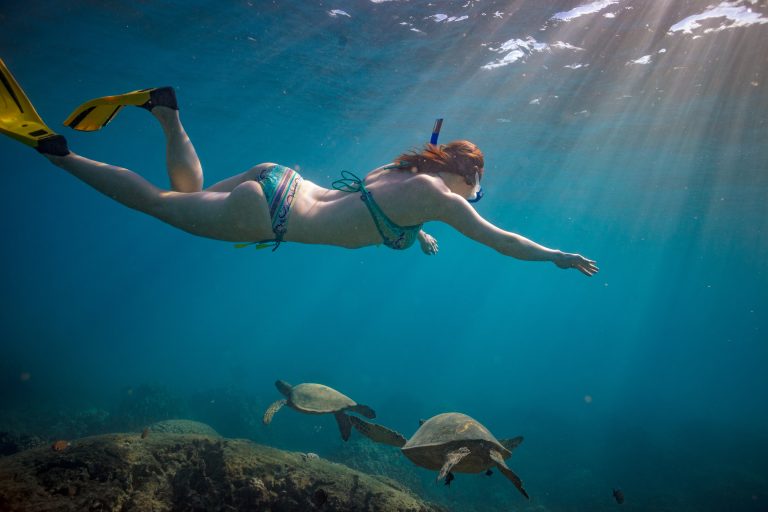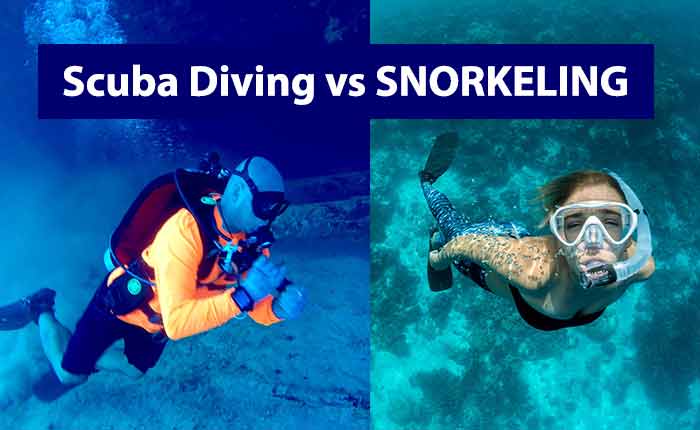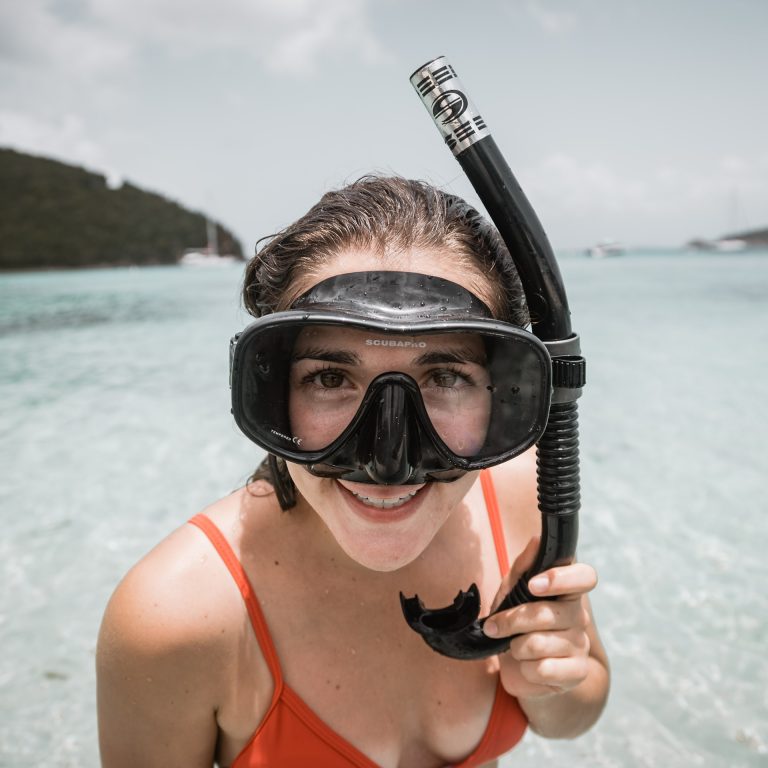Can You Snorkel While Pregnant?
Is Snorkeling Safe For Pregnant Women? Let’s Ask The Doctors
Can You Snorkel While Pregnant?
The pregnancy miracle is an awe-inspiring journey, marked by the remarkable process of creating and welcoming new life into the world. It’s a time of profound change and immense beauty but also demands significant sacrifices from expectant mothers. Comfort, diet, wardrobe, and favorite pastimes often undergo drastic alterations to prioritize the health and well-being of both mother and child.
One question frequently arises during this transformative period is whether activities like Snorkeling are safe for pregnant women. The allure of Snorkeling during pregnancy is undeniable. It offers a rare opportunity to lie on your stomach, alleviating the pressure on knees and ankles while experiencing a sense of weightlessness. This can be a blissful respite from the physical strains of pregnancy, offering stress relief and relaxation.
So, can you snorkel while pregnant? The answer is an encouraging yes! Medical professionals and authoritative bodies like the CDC agree that Snorkeling can be a beneficial and safe activity for expectant mothers. It provides a low-impact way to stay active and enjoy nature, contributing positively to mental and physical well-being. However, while Snorkeling is safe, scuba diving is not recommended during pregnancy. It’s crucial to consult your doctor before engaging in any exercise, including Snorkeling, to ensure it aligns with your unique health needs and pregnancy journey.
This article isn’t intended as medical advice but rather as a guide to understanding the considerations and recommendations surrounding Snorkeling during pregnancy. Let’s delve into the insights of medical experts and explore the key factors to keep in mind for a safe and enjoyable snorkeling experience while expecting.
Belly and the Blue: A Mom’s Guide to Snorkeling While Pregnant
Risks of Snorkeling while Pregnant

Snorkeling is a popular recreational activity enjoyed by many. However, when it comes to Snorkeling while pregnant, there are several factors to consider. It’s always important to consult your healthcare provider before engaging in physical activity during pregnancy. Here are some general risks and specific concerns associated with Snorkeling while pregnant:
General Risks:
- Physical Exertion: Snorkeling can be physically demanding. Pregnant women often experience changes in their cardiovascular and respiratory systems, making physical exertion more challenging.
- Risk of Falling or Slipping: The risk of falling or slipping on a wet surface or boat deck is higher. A fall could harm the mother and the baby.
- Dehydration and Overheating: Snorkeling in hot climates can lead to dehydration and overheating, which can be harmful during pregnancy.
Specific Concerns:
- Water Pressure: While the water pressure experienced during Snorkeling is not as intense as scuba diving, it can still impact. However, the human body, including a pregnant one, is primarily composed of incompressible fluids that can handle the pressure changes experienced while Snorkeling.
- Decompression Sickness: This is a concern related to scuba diving rather than Snorkeling. Snorkelers usually don’t go deep enough underwater for decompression sickness to be a concern.
- Exhaustion: Pregnancy can cause fatigue, and Snorkeling can exacerbate this. It’s essential to listen to your body and rest when needed.
For example, consider Jane, who is an avid snorkeler and is now pregnant. She consults her doctor, who advises her to continue Snorkeling if she feels comfortable but to stay hydrated, avoid overheating, and rest when needed. Jane decides to continue Snorkeling but takes frequent breaks and stays close to the shore.
Medical Advice

While the joy of Snorkeling is undeniable, it’s crucial to remember that medical advice should always be your first port of call when it comes to Snorkeling during pregnancy. As much as we cherish the underwater world and wouldn’t want anyone to miss out on its wonders, the safety of both mother and baby is paramount.
I’ve gathered insights from five distinguished doctors whose expertise spans various fields to provide you with the most reliable information. These include obstetrics and gynecology (OBGYN), physicians from specialized hyperbaric centers (the go-to experts if one experiences decompression sickness, also known as ‘the bends,’ from scuba diving), and esteemed professors from medical schools. The diversity of their specializations ensures a comprehensive understanding of the subject.
Doctors Advice:
- Dr. Enrico Camporesi found that while scuba diving is unsafe for pregnant women, Snorkeling can still be practiced during pregnancy.
- Dr. Shivani Patel notes that lap swimming and Snorkeling are fun ways to stay active while reducing pressure on your knees and ankles. These exercises are generally safe throughout pregnancy.
- Drs. Diane F. Morof and I. Dale Carroll from the CDC say swimming and Snorkeling during pregnancy are generally safe.
- Dr. Nivin Todd mentions that exercise while pregnant shouldn’t happen at an elevation that is too high or underwater. The alternative? Try Snorkeling instead.
Trimester Recommendations
As for specific recommendations for each trimester, it’s important to note that these can vary greatly depending on the individual’s health, fitness level, and comfort. However, here are some general guidelines:
- First Trimester: Most women can continue their pre-pregnancy exercise routines during the first trimester. If you were snorkeling before pregnancy and feel comfortable, you can continue. However, listen to your body and rest when needed.
- Second Trimester: As your belly grows, your center of gravity shifts, affecting your balance. Be extra cautious when entering and exiting the water to avoid slips and falls. Continue to listen to your body and rest when needed.
- Third Trimester: During the third trimester, you might find it more challenging to move around. If you feel comfortable in the water and your doctor has given the okay, you can continue to snorkel. However, avoid deep water and strong currents.
Safety Guidelines
Snorkeling is a fun and relaxing activity that can be enjoyed by pregnant women, but it is essential to consult your doctor before you go. Your doctor can advise you on the best time, duration, and intensity of Snorkeling based on your health and pregnancy status. Snorkeling is usually a low-risk and low-impact exercise, but some conditions or complications may make it unsafe or uncomfortable for you or your baby. Therefore, we’ve mentioned some safety tips for that purpose, let’s have a look:
Safety tips for Snorkeling during pregnancy
Here, we are discussing some Precautions for Snorkeling while pregnant.
- Consult your doctor before Snorkeling. Snorkeling is generally considered a low-risk activity for pregnant women, but it is always advisable to check with your doctor before engaging in any physical activity during pregnancy. Your doctor can advise you on the best time to snorkel, the duration and intensity of Snorkeling, and any precautions or contraindications you may have.
- Choose a calm and shallow site. Snorkeling in deep or rough waters can pose risks such as decompression sickness, barotrauma, or marine hazards. Snorkeling in calm and shallow waters can reduce these risks and allow you to enjoy the underwater scenery without exerting too much. You can also quickly return to the surface or the shore if you feel tired or uncomfortable.
- Wear appropriate and comfortable equipment. Snorkeling equipment consists of a mask, a snorkel, and fins. You should choose equipment that fits you well and does not cause discomfort or irritation. A mask that is too tight or loose can cause leaks, fogging, or pressure on your face. A snorkel that is too long or too short can cause breathing difficulties or water ingestion. Fins that are too big or small can cause blisters, cramps, or fatigue. You can also wear a snorkeling vest, a rash guard, or a wetsuit to provide extra buoyancy, protection, and warmth.
- Snorkel with a buddy or a guide. Snorkeling with a buddy or a guide can enhance your safety and enjoyment. A buddy or a guide can help you in an emergency, such as cramps, fatigue, or injury. They can highlight interesting marine life, share tips and tricks, and take photos or videos of your snorkeling adventure. You should always stay close to your buddy or guide and communicate with them using hand signals or verbal cues.
- Stay hydrated and nourished. Snorkeling can dehydrate and deplete your body’s energy, especially in hot and sunny conditions. You should drink plenty of water before, during, and after snorkeling to prevent dehydration and its complications, such as headaches, dizziness, or nausea. You should also eat a light and nutritious snack before snorkeling to provide you with energy and prevent hunger or low blood sugar. You can bring snacks and drinks on the boat or the shore and consume them after Snorkeling.
- Listen to your body and limit your snorkeling time. Snorkeling can be physically and mentally demanding, especially for pregnant women. You should listen to your body and restrict your snorkeling time to avoid overexertion, exhaustion, or overheating. You should also monitor your breathing, heart rate, and blood pressure and stop snorkeling if you experience any signs of distress, such as shortness of breath, chest pain, palpitations, or fainting. You should also avoid Snorkeling if you have any symptoms of infection, such as fever, cough, or sore throat.
Best types of Snorkeling Gear for Pregnant Women
The best equipment for Snorkeling during pregnancy is comfortable, easy to use, and suitable for your snorkeling site and conditions. Here are some examples of equipment you can use for Snorkeling during pregnancy.
- Mask: A Snorkel mask is essential for Snorkeling, as it lets you see underwater activities clearly during pregnancy. You should choose a mask that fits your face shape and size and has a soft, flexible skirt that seals well around your eyes and nose. You should also select a mask with an adjustable strap that does not pull your hair or cause pressure on your head. You can test the fit of a mask by placing it on your face without the strap and inhaling it through your nose. If the mask stays on your face without leaks, it is a good fit. You can also apply some anti-fog solution or saliva to the inside of the mask lens to prevent fogging.
- Snorkel: A snorkel is a tube allowing you to breathe through your mouth while submerging your face. You should choose a snorkel with a comfortable and ergonomic mouthpiece that does not cause jaw fatigue or soreness. You should also choose a snorkel that has a purge valve that allows you to expel any water that enters the snorkel. You can also choose a snorkel with a splash guard or a dry top that prevents water from entering the snorkel when you dive or encounter waves. You should attach the snorkel to the left side of your mask strap and adjust the height and angle of the snorkel to suit your preference.
- Fins: Fins attach to your feet and help you propel yourself through the water. You should choose fins that fit your foot size and shape and have a soft, flexible foot pocket that does not cause blisters or cramps. You should also decide on fins with a suitable blade length and stiffness that match your snorkeling style and skill level. You can choose between full-foot fins or open-heel fins. Full-foot fins are more comfortable and lightweight but may not fit well if your feet swell during pregnancy. Open-heel fins are more adjustable and versatile but require wearing booties or socks to prevent chafing or rubbing. You should also choose fins with a quick-release buckle or a strap that lets you quickly put on and take off the fins. You should wear the fins only in the water and avoid walking or standing with them on land.
Benefits of Snorkeling While Pregnant
Snorkeling while pregnant can benefit you and your baby as long as you follow the safety tips and precautions mentioned above. Here are some of the Benefits of Snorkeling during pregnancy:
- Stress relief: Snorkeling can help you relax and reduce stress, which benefits your mental and emotional health. Snorkeling can also release endorphins, natural chemicals that make you happy and calm. According to Dr. Sarah Jarvis, a clinical director at Patient.info, “Snorkeling can be a great way to unwind and enjoy nature, which can boost your mood and lower your cortisol levels. Cortisol is a hormone that is associated with stress and anxiety, and high levels of it can have negative effects on your pregnancy, such as increasing the risk of preterm labor or low birth weight.”
- Light exercise: Snorkeling can provide light and gentle exercise, which is good for your physical health and fitness. Snorkeling can improve your cardiovascular and respiratory systems, which can help you cope with the increased demands of pregnancy. Snorkeling can also tone your muscles and joints, which can help you prevent or ease common pregnancy discomforts, such as back pain, leg cramps, or swelling. According to Dr. Sherry Ross, an OB-GYN and women’s health expert, “Snorkeling can be a great way to stay active and fit during pregnancy, as it can burn calories, improve blood circulation, and strengthen your core and pelvic floor muscles. These can help you prepare for labor and delivery and speed up your recovery after birth.”
- Bonding with your baby: Snorkeling can also help you bond with your baby, as you can share the experience of exploring the underwater world together. Snorkeling can stimulate your baby’s senses, such as hearing, touch, and movement, enhancing their development and growth. Snorkeling can also make you feel more connected and attuned to your baby, as you can feel their movements and reactions to the water. According to Dr. Laura Riley, a maternal-fetal medicine specialist and author of You and Your Baby: Pregnancy, “Snorkeling can be a wonderful way to bond with your baby, as it can create a sense of intimacy and harmony between you and your baby. Snorkeling can also make you more aware and appreciative of your baby’s presence and personality, which can foster a positive and loving relationship.”
Personal Stories
Emma Perkins: A snorkeling enthusiast and a mom of two
I’m Emma Perkins, the owner, and writer at Adventure in Blue. As a passionate mother of two and an avid snorkeler, I’ve had some genuinely positive experiences snorkeling during my pregnancies. My love for Snorkeling has taken me to Hawaii, the Maldives, and Australia, and I made the decision to continue this activity while pregnant. This decision came after careful consultation with my doctor and thorough research into the Safety of Snorkeling while pregnant.
By following safety guidelines, such as choosing calm sites and wearing the proper equipment, I discovered numerous benefits from Snorkeling during pregnancy. It helped reduce stress, improved my mental and emotional well-being, and provided a form of light exercise that enhanced my physical fitness.
This experience allowed me to feel a deeper connection with my unborn babies. It was a safe, enjoyable, and exciting adventure celebrating life’s and nature’s beauty. By taking precautions and staying hydrated, I encountered no complications and was blessed with the birth of healthy, happy babies.
I wholeheartedly recommend snorkeling to other pregnant women. It’s a fun and relaxing activity that fosters a unique bond with your unborn child. So, why not dive in and celebrate life’s and nature’s beauty?
Sarah Jones: A snorkeling newbie and a mom of one
Sarah Jones, a mom of one and a reader of our site, had a challenging pregnancy marked by morning sickness, back pain, mood swings, and feelings of isolation. However, her life turned positive when her doctor recommended Snorkeling as a therapeutic activity.
Snorkeling offered Sarah numerous benefits:
- Relaxation and Stress Reduction: The calming underwater environment helped alleviate her stress, contributing to improved mental and emotional health.
- Light Exercise: Snorkeling was a gentle exercise, enhancing her physical health and fitness.
- Bonding with Baby: Feeling her baby’s movements and reactions to the water fostered a unique bond.
- Social Interaction: Meeting other snorkelers and locals gave her a supportive community.
- Fun and Excitement: The thrill of exploring underwater life brought joy and excitement into her life.
Sarah, initially skeptical, decided to try Snorkeling during her pregnancy. She booked a tour with a reputable company and received the necessary equipment and guidance. She overcame initial nerves and found comfort in the water, marveling at the vibrant underwater scenery and feeling a special connection with her baby. The experience facilitated social interactions with other snorkelers and locals, adding a unique aspect to her journey.
Snorkeling proved transformative for Sarah, helping her overcome depression, enjoy her pregnancy, and improve her overall health. The result was a healthy, happy baby and unforgettable photos and videos. Sarah enthusiastically recommends snorkeling to pregnant women, highlighting it as a fun, relaxing activity that enhances well-being and fosters a unique connection with unborn babies. It’s portrayed as a beautiful way to celebrate life and nature and prepare for motherhood.
Conclusion
Expectant mothers often find themselves parting ways with various activities during pregnancy. The silver lining? As medical professionals and the CDC have affirmed, snorkeling doesn’t usually make the list.
Before diving into the underwater world while expecting, it’s wise to consult with your personal healthcare provider. This piece is far from dispensing medical advice, yet wonderfully, the prevailing sentiment in the medical realm leans towards endorsing Snorkeling as a generally safe pursuit for pregnant women. How fantastic is that?
While reveling in this aquatic adventure, exercise prudence by choosing serene snorkeling conditions and steering clear of overheating. Additionally, safeguard your journey by securing travel medical insurance that comprehensively covers both snorkeling escapades and the beautiful pregnancy journey.
References:
- The American College of Obstetricians and Gynecologists. (2019, July). “Exercise During Pregnancy.” ACOG website.
- Tara Bradley Connell. (N.D.) “Pregnancy and Diving: What You Need to Know.” PADI website.
Like this post? Please share or pin it for later. You may also keep up with us on Facebook, Instagram, and Pinterest to stay informed.






